International Relations: Marxism's Relevance in Today's World
VerifiedAdded on 2023/04/21
|8
|2029
|177
Essay
AI Summary
This essay explores the enduring relevance of Marxism in contemporary society, beginning with a definition of Marxism and its core tenets as a political and economic theory rooted in the works of Karl Marx and Friedrich Engels. It examines the impact of Marxism on society, particularly in the context of capitalism and class struggle, and analyzes whether Marxism remains relevant in the 21st century. The essay highlights real-life examples, such as the rise of China and the ongoing debates surrounding labor costs and social inequality, to support its arguments. It discusses the challenges of capitalism, including unemployment and economic threats, and argues that Marxist theories offer a valuable framework for understanding and addressing these issues. The author concludes that Marxism, with its focus on class conflict and social well-being, remains a pertinent ideology for understanding and potentially resolving the problems of the modern world. The essay also references various academic sources to support its arguments.
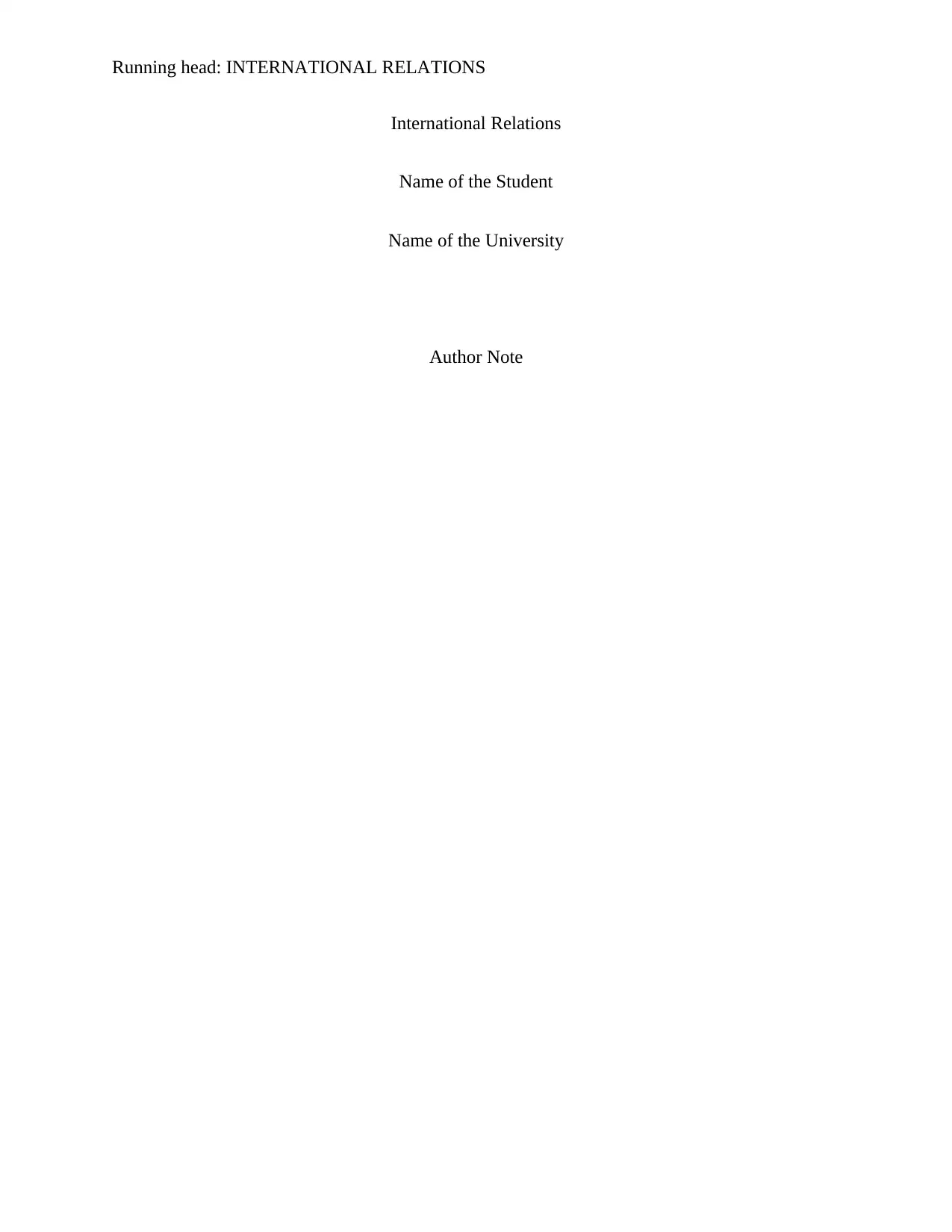
Running head: INTERNATIONAL RELATIONS
International Relations
Name of the Student
Name of the University
Author Note
International Relations
Name of the Student
Name of the University
Author Note
Paraphrase This Document
Need a fresh take? Get an instant paraphrase of this document with our AI Paraphraser
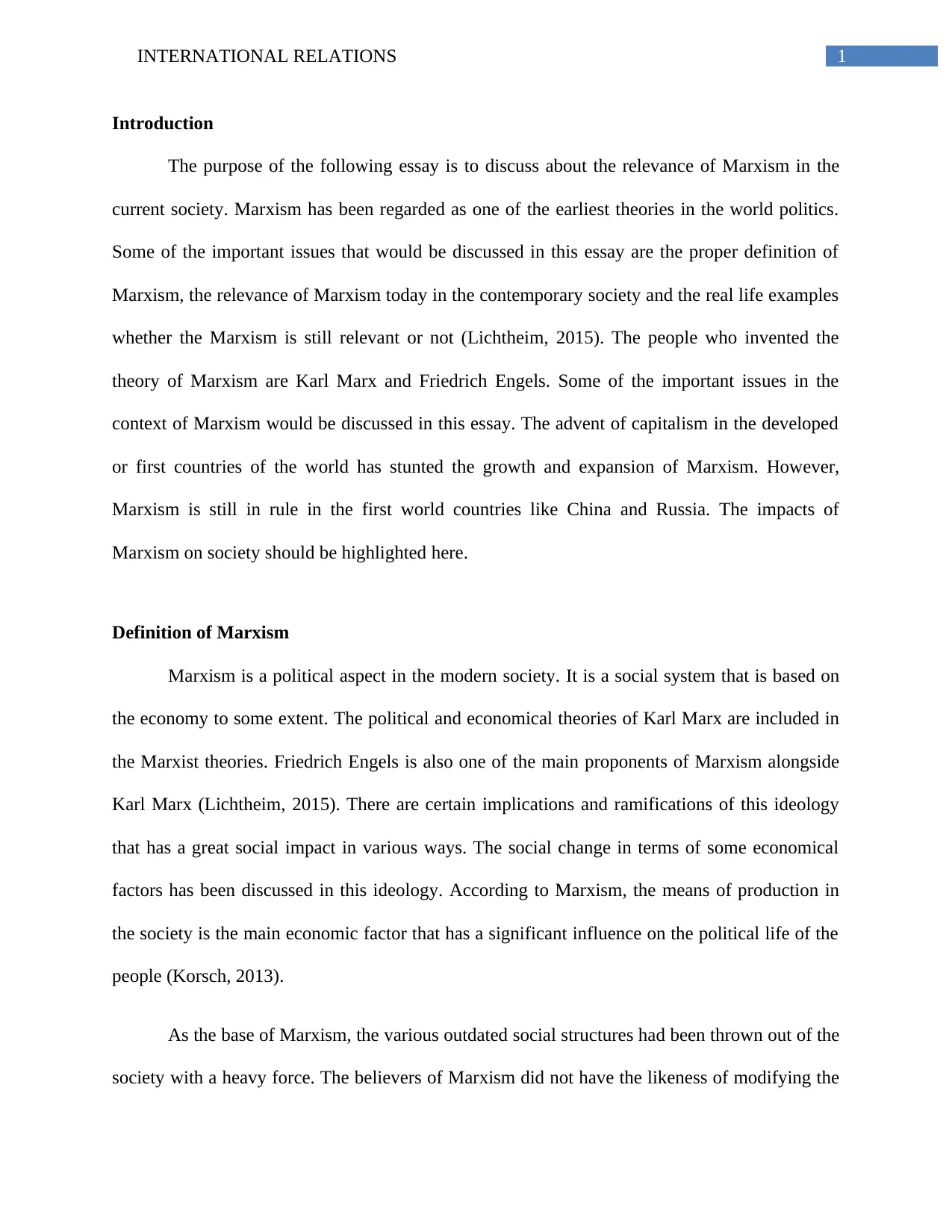
1INTERNATIONAL RELATIONS
Introduction
The purpose of the following essay is to discuss about the relevance of Marxism in the
current society. Marxism has been regarded as one of the earliest theories in the world politics.
Some of the important issues that would be discussed in this essay are the proper definition of
Marxism, the relevance of Marxism today in the contemporary society and the real life examples
whether the Marxism is still relevant or not (Lichtheim, 2015). The people who invented the
theory of Marxism are Karl Marx and Friedrich Engels. Some of the important issues in the
context of Marxism would be discussed in this essay. The advent of capitalism in the developed
or first countries of the world has stunted the growth and expansion of Marxism. However,
Marxism is still in rule in the first world countries like China and Russia. The impacts of
Marxism on society should be highlighted here.
Definition of Marxism
Marxism is a political aspect in the modern society. It is a social system that is based on
the economy to some extent. The political and economical theories of Karl Marx are included in
the Marxist theories. Friedrich Engels is also one of the main proponents of Marxism alongside
Karl Marx (Lichtheim, 2015). There are certain implications and ramifications of this ideology
that has a great social impact in various ways. The social change in terms of some economical
factors has been discussed in this ideology. According to Marxism, the means of production in
the society is the main economic factor that has a significant influence on the political life of the
people (Korsch, 2013).
As the base of Marxism, the various outdated social structures had been thrown out of the
society with a heavy force. The believers of Marxism did not have the likeness of modifying the
Introduction
The purpose of the following essay is to discuss about the relevance of Marxism in the
current society. Marxism has been regarded as one of the earliest theories in the world politics.
Some of the important issues that would be discussed in this essay are the proper definition of
Marxism, the relevance of Marxism today in the contemporary society and the real life examples
whether the Marxism is still relevant or not (Lichtheim, 2015). The people who invented the
theory of Marxism are Karl Marx and Friedrich Engels. Some of the important issues in the
context of Marxism would be discussed in this essay. The advent of capitalism in the developed
or first countries of the world has stunted the growth and expansion of Marxism. However,
Marxism is still in rule in the first world countries like China and Russia. The impacts of
Marxism on society should be highlighted here.
Definition of Marxism
Marxism is a political aspect in the modern society. It is a social system that is based on
the economy to some extent. The political and economical theories of Karl Marx are included in
the Marxist theories. Friedrich Engels is also one of the main proponents of Marxism alongside
Karl Marx (Lichtheim, 2015). There are certain implications and ramifications of this ideology
that has a great social impact in various ways. The social change in terms of some economical
factors has been discussed in this ideology. According to Marxism, the means of production in
the society is the main economic factor that has a significant influence on the political life of the
people (Korsch, 2013).
As the base of Marxism, the various outdated social structures had been thrown out of the
society with a heavy force. The believers of Marxism did not have the likeness of modifying the
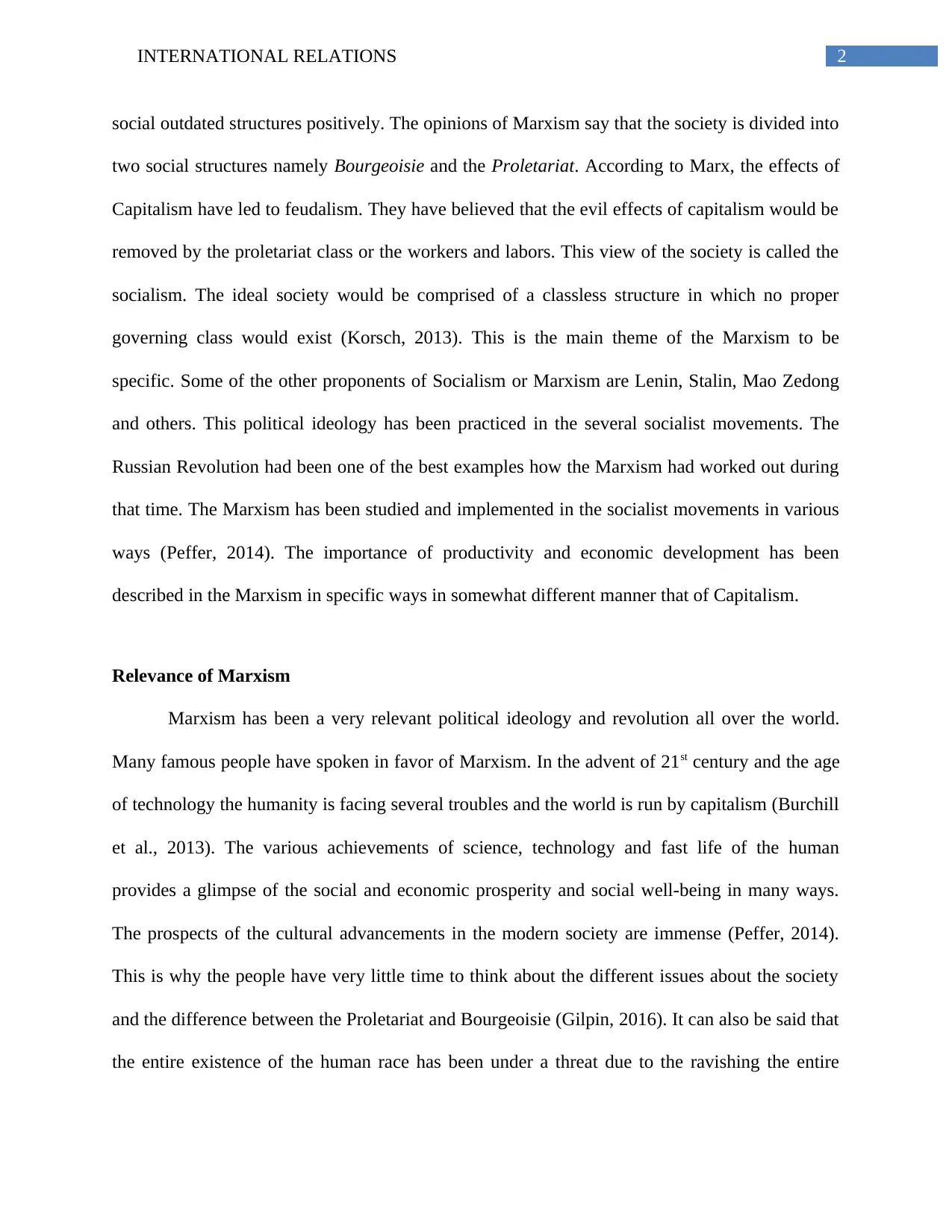
2INTERNATIONAL RELATIONS
social outdated structures positively. The opinions of Marxism say that the society is divided into
two social structures namely Bourgeoisie and the Proletariat. According to Marx, the effects of
Capitalism have led to feudalism. They have believed that the evil effects of capitalism would be
removed by the proletariat class or the workers and labors. This view of the society is called the
socialism. The ideal society would be comprised of a classless structure in which no proper
governing class would exist (Korsch, 2013). This is the main theme of the Marxism to be
specific. Some of the other proponents of Socialism or Marxism are Lenin, Stalin, Mao Zedong
and others. This political ideology has been practiced in the several socialist movements. The
Russian Revolution had been one of the best examples how the Marxism had worked out during
that time. The Marxism has been studied and implemented in the socialist movements in various
ways (Peffer, 2014). The importance of productivity and economic development has been
described in the Marxism in specific ways in somewhat different manner that of Capitalism.
Relevance of Marxism
Marxism has been a very relevant political ideology and revolution all over the world.
Many famous people have spoken in favor of Marxism. In the advent of 21st century and the age
of technology the humanity is facing several troubles and the world is run by capitalism (Burchill
et al., 2013). The various achievements of science, technology and fast life of the human
provides a glimpse of the social and economic prosperity and social well-being in many ways.
The prospects of the cultural advancements in the modern society are immense (Peffer, 2014).
This is why the people have very little time to think about the different issues about the society
and the difference between the Proletariat and Bourgeoisie (Gilpin, 2016). It can also be said that
the entire existence of the human race has been under a threat due to the ravishing the entire
social outdated structures positively. The opinions of Marxism say that the society is divided into
two social structures namely Bourgeoisie and the Proletariat. According to Marx, the effects of
Capitalism have led to feudalism. They have believed that the evil effects of capitalism would be
removed by the proletariat class or the workers and labors. This view of the society is called the
socialism. The ideal society would be comprised of a classless structure in which no proper
governing class would exist (Korsch, 2013). This is the main theme of the Marxism to be
specific. Some of the other proponents of Socialism or Marxism are Lenin, Stalin, Mao Zedong
and others. This political ideology has been practiced in the several socialist movements. The
Russian Revolution had been one of the best examples how the Marxism had worked out during
that time. The Marxism has been studied and implemented in the socialist movements in various
ways (Peffer, 2014). The importance of productivity and economic development has been
described in the Marxism in specific ways in somewhat different manner that of Capitalism.
Relevance of Marxism
Marxism has been a very relevant political ideology and revolution all over the world.
Many famous people have spoken in favor of Marxism. In the advent of 21st century and the age
of technology the humanity is facing several troubles and the world is run by capitalism (Burchill
et al., 2013). The various achievements of science, technology and fast life of the human
provides a glimpse of the social and economic prosperity and social well-being in many ways.
The prospects of the cultural advancements in the modern society are immense (Peffer, 2014).
This is why the people have very little time to think about the different issues about the society
and the difference between the Proletariat and Bourgeoisie (Gilpin, 2016). It can also be said that
the entire existence of the human race has been under a threat due to the ravishing the entire
⊘ This is a preview!⊘
Do you want full access?
Subscribe today to unlock all pages.

Trusted by 1+ million students worldwide
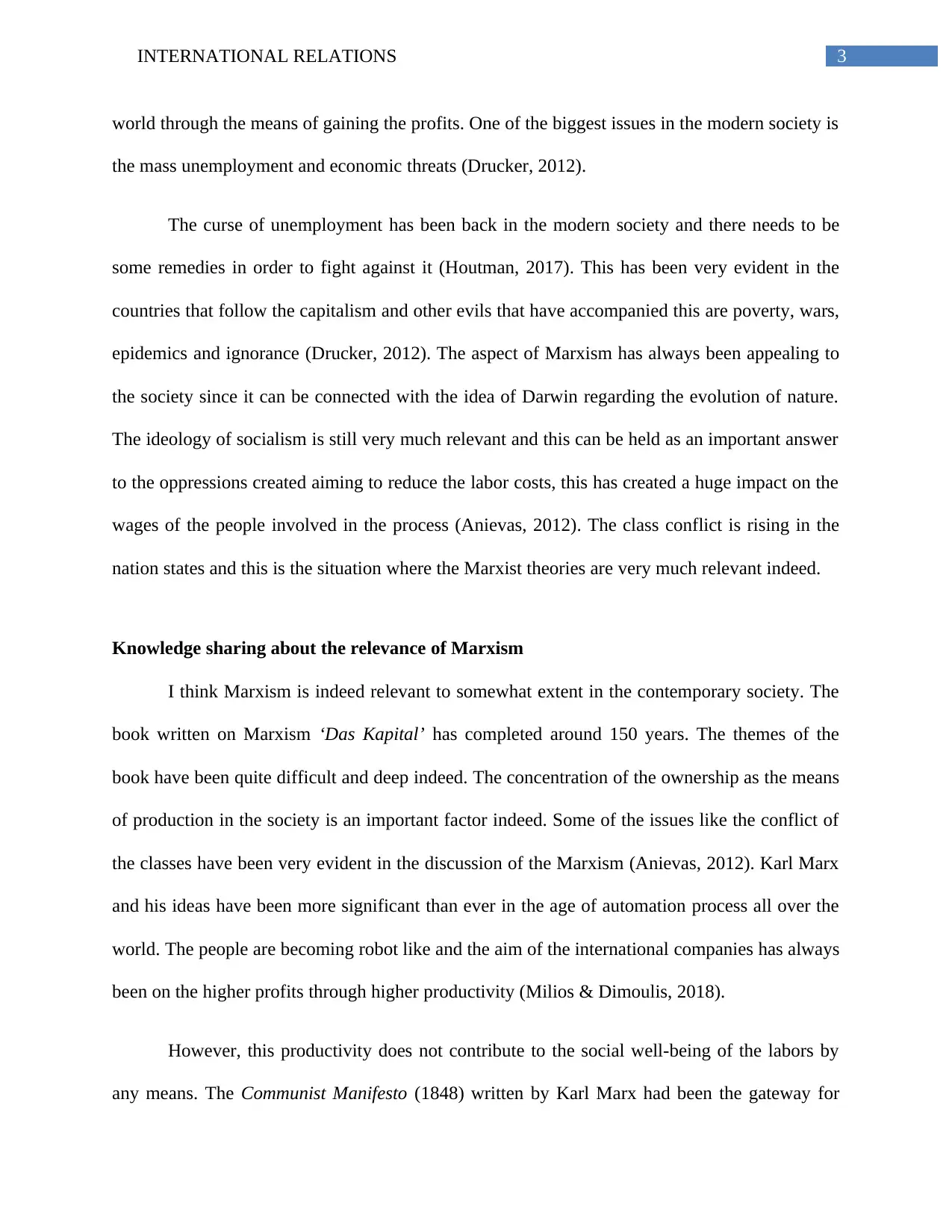
3INTERNATIONAL RELATIONS
world through the means of gaining the profits. One of the biggest issues in the modern society is
the mass unemployment and economic threats (Drucker, 2012).
The curse of unemployment has been back in the modern society and there needs to be
some remedies in order to fight against it (Houtman, 2017). This has been very evident in the
countries that follow the capitalism and other evils that have accompanied this are poverty, wars,
epidemics and ignorance (Drucker, 2012). The aspect of Marxism has always been appealing to
the society since it can be connected with the idea of Darwin regarding the evolution of nature.
The ideology of socialism is still very much relevant and this can be held as an important answer
to the oppressions created aiming to reduce the labor costs, this has created a huge impact on the
wages of the people involved in the process (Anievas, 2012). The class conflict is rising in the
nation states and this is the situation where the Marxist theories are very much relevant indeed.
Knowledge sharing about the relevance of Marxism
I think Marxism is indeed relevant to somewhat extent in the contemporary society. The
book written on Marxism ‘Das Kapital’ has completed around 150 years. The themes of the
book have been quite difficult and deep indeed. The concentration of the ownership as the means
of production in the society is an important factor indeed. Some of the issues like the conflict of
the classes have been very evident in the discussion of the Marxism (Anievas, 2012). Karl Marx
and his ideas have been more significant than ever in the age of automation process all over the
world. The people are becoming robot like and the aim of the international companies has always
been on the higher profits through higher productivity (Milios & Dimoulis, 2018).
However, this productivity does not contribute to the social well-being of the labors by
any means. The Communist Manifesto (1848) written by Karl Marx had been the gateway for
world through the means of gaining the profits. One of the biggest issues in the modern society is
the mass unemployment and economic threats (Drucker, 2012).
The curse of unemployment has been back in the modern society and there needs to be
some remedies in order to fight against it (Houtman, 2017). This has been very evident in the
countries that follow the capitalism and other evils that have accompanied this are poverty, wars,
epidemics and ignorance (Drucker, 2012). The aspect of Marxism has always been appealing to
the society since it can be connected with the idea of Darwin regarding the evolution of nature.
The ideology of socialism is still very much relevant and this can be held as an important answer
to the oppressions created aiming to reduce the labor costs, this has created a huge impact on the
wages of the people involved in the process (Anievas, 2012). The class conflict is rising in the
nation states and this is the situation where the Marxist theories are very much relevant indeed.
Knowledge sharing about the relevance of Marxism
I think Marxism is indeed relevant to somewhat extent in the contemporary society. The
book written on Marxism ‘Das Kapital’ has completed around 150 years. The themes of the
book have been quite difficult and deep indeed. The concentration of the ownership as the means
of production in the society is an important factor indeed. Some of the issues like the conflict of
the classes have been very evident in the discussion of the Marxism (Anievas, 2012). Karl Marx
and his ideas have been more significant than ever in the age of automation process all over the
world. The people are becoming robot like and the aim of the international companies has always
been on the higher profits through higher productivity (Milios & Dimoulis, 2018).
However, this productivity does not contribute to the social well-being of the labors by
any means. The Communist Manifesto (1848) written by Karl Marx had been the gateway for
Paraphrase This Document
Need a fresh take? Get an instant paraphrase of this document with our AI Paraphraser
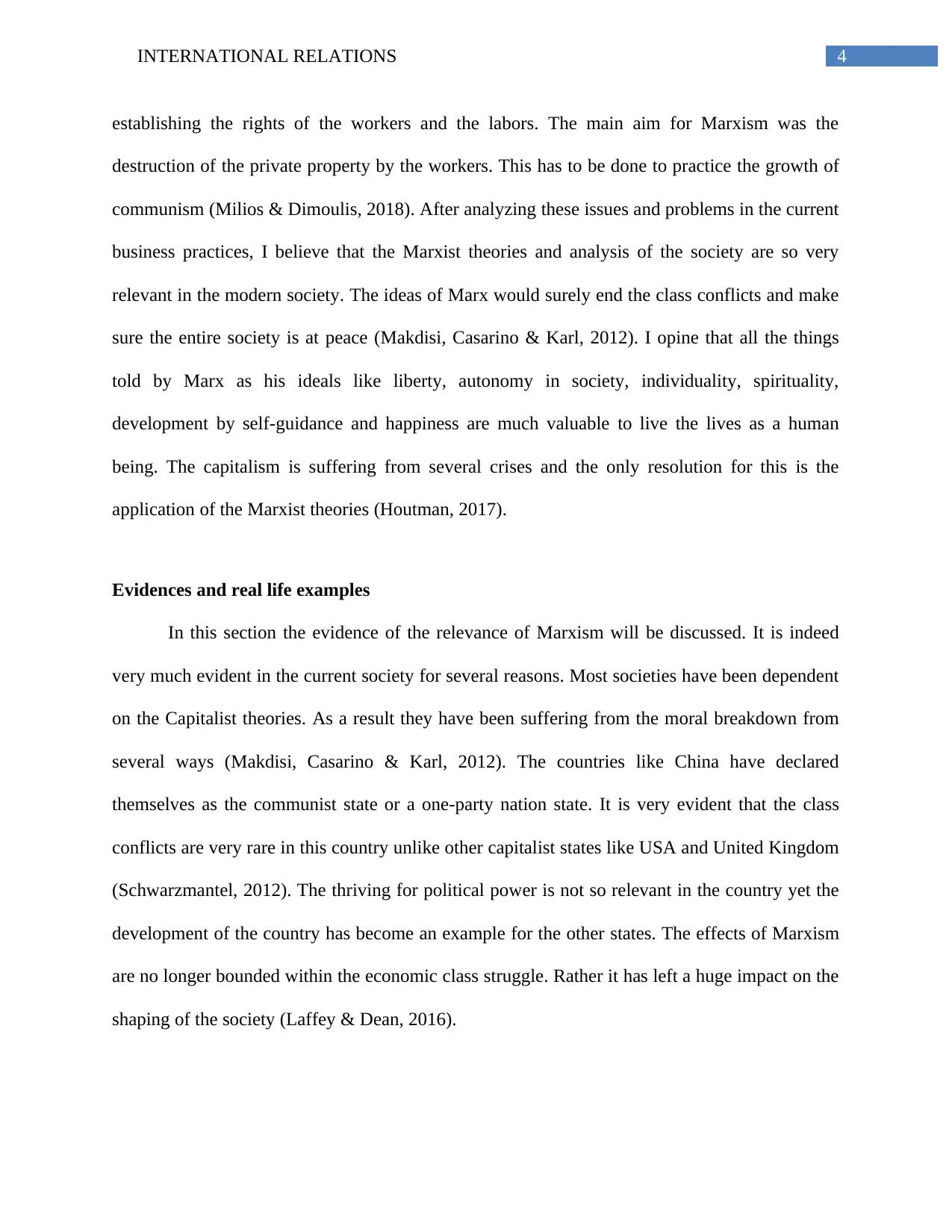
4INTERNATIONAL RELATIONS
establishing the rights of the workers and the labors. The main aim for Marxism was the
destruction of the private property by the workers. This has to be done to practice the growth of
communism (Milios & Dimoulis, 2018). After analyzing these issues and problems in the current
business practices, I believe that the Marxist theories and analysis of the society are so very
relevant in the modern society. The ideas of Marx would surely end the class conflicts and make
sure the entire society is at peace (Makdisi, Casarino & Karl, 2012). I opine that all the things
told by Marx as his ideals like liberty, autonomy in society, individuality, spirituality,
development by self-guidance and happiness are much valuable to live the lives as a human
being. The capitalism is suffering from several crises and the only resolution for this is the
application of the Marxist theories (Houtman, 2017).
Evidences and real life examples
In this section the evidence of the relevance of Marxism will be discussed. It is indeed
very much evident in the current society for several reasons. Most societies have been dependent
on the Capitalist theories. As a result they have been suffering from the moral breakdown from
several ways (Makdisi, Casarino & Karl, 2012). The countries like China have declared
themselves as the communist state or a one-party nation state. It is very evident that the class
conflicts are very rare in this country unlike other capitalist states like USA and United Kingdom
(Schwarzmantel, 2012). The thriving for political power is not so relevant in the country yet the
development of the country has become an example for the other states. The effects of Marxism
are no longer bounded within the economic class struggle. Rather it has left a huge impact on the
shaping of the society (Laffey & Dean, 2016).
establishing the rights of the workers and the labors. The main aim for Marxism was the
destruction of the private property by the workers. This has to be done to practice the growth of
communism (Milios & Dimoulis, 2018). After analyzing these issues and problems in the current
business practices, I believe that the Marxist theories and analysis of the society are so very
relevant in the modern society. The ideas of Marx would surely end the class conflicts and make
sure the entire society is at peace (Makdisi, Casarino & Karl, 2012). I opine that all the things
told by Marx as his ideals like liberty, autonomy in society, individuality, spirituality,
development by self-guidance and happiness are much valuable to live the lives as a human
being. The capitalism is suffering from several crises and the only resolution for this is the
application of the Marxist theories (Houtman, 2017).
Evidences and real life examples
In this section the evidence of the relevance of Marxism will be discussed. It is indeed
very much evident in the current society for several reasons. Most societies have been dependent
on the Capitalist theories. As a result they have been suffering from the moral breakdown from
several ways (Makdisi, Casarino & Karl, 2012). The countries like China have declared
themselves as the communist state or a one-party nation state. It is very evident that the class
conflicts are very rare in this country unlike other capitalist states like USA and United Kingdom
(Schwarzmantel, 2012). The thriving for political power is not so relevant in the country yet the
development of the country has become an example for the other states. The effects of Marxism
are no longer bounded within the economic class struggle. Rather it has left a huge impact on the
shaping of the society (Laffey & Dean, 2016).
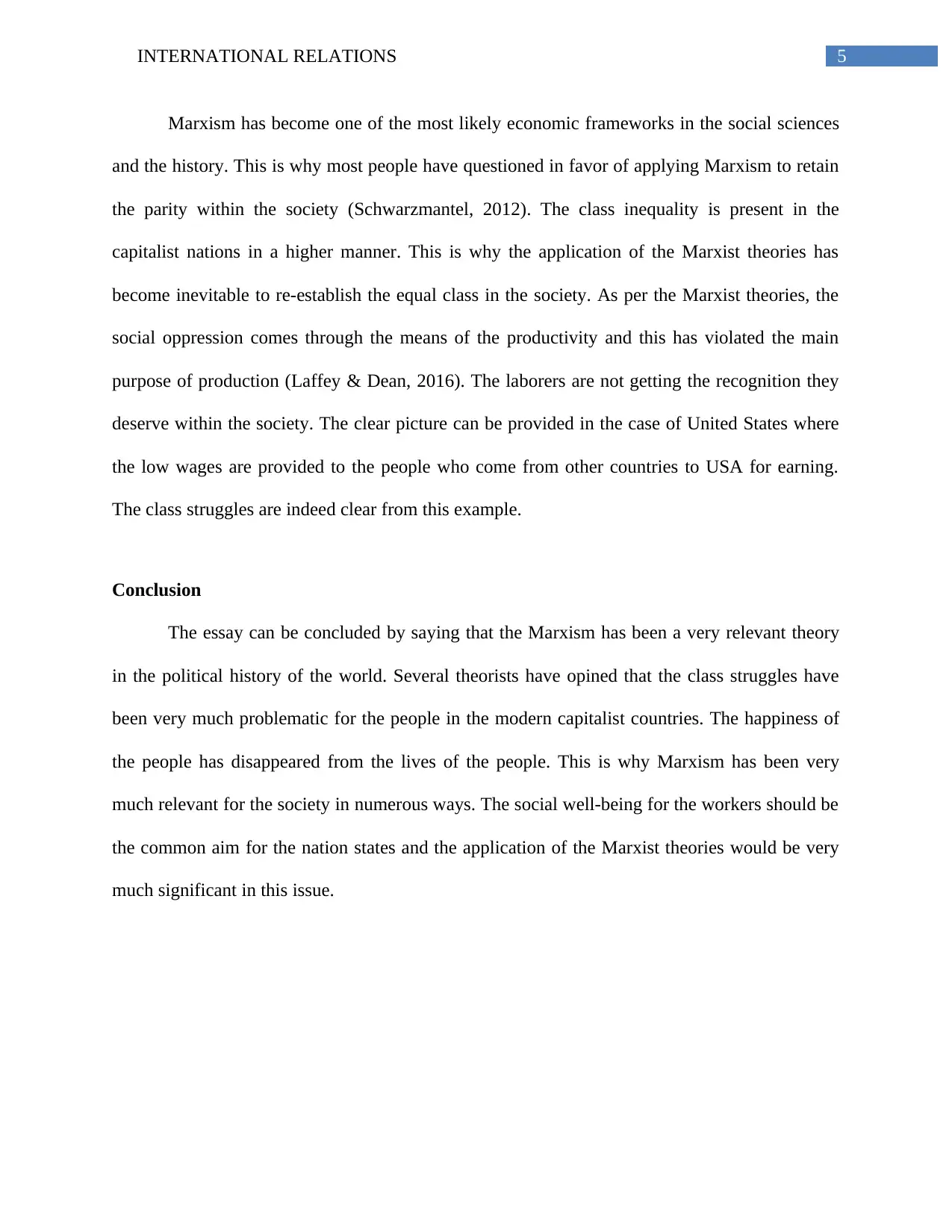
5INTERNATIONAL RELATIONS
Marxism has become one of the most likely economic frameworks in the social sciences
and the history. This is why most people have questioned in favor of applying Marxism to retain
the parity within the society (Schwarzmantel, 2012). The class inequality is present in the
capitalist nations in a higher manner. This is why the application of the Marxist theories has
become inevitable to re-establish the equal class in the society. As per the Marxist theories, the
social oppression comes through the means of the productivity and this has violated the main
purpose of production (Laffey & Dean, 2016). The laborers are not getting the recognition they
deserve within the society. The clear picture can be provided in the case of United States where
the low wages are provided to the people who come from other countries to USA for earning.
The class struggles are indeed clear from this example.
Conclusion
The essay can be concluded by saying that the Marxism has been a very relevant theory
in the political history of the world. Several theorists have opined that the class struggles have
been very much problematic for the people in the modern capitalist countries. The happiness of
the people has disappeared from the lives of the people. This is why Marxism has been very
much relevant for the society in numerous ways. The social well-being for the workers should be
the common aim for the nation states and the application of the Marxist theories would be very
much significant in this issue.
Marxism has become one of the most likely economic frameworks in the social sciences
and the history. This is why most people have questioned in favor of applying Marxism to retain
the parity within the society (Schwarzmantel, 2012). The class inequality is present in the
capitalist nations in a higher manner. This is why the application of the Marxist theories has
become inevitable to re-establish the equal class in the society. As per the Marxist theories, the
social oppression comes through the means of the productivity and this has violated the main
purpose of production (Laffey & Dean, 2016). The laborers are not getting the recognition they
deserve within the society. The clear picture can be provided in the case of United States where
the low wages are provided to the people who come from other countries to USA for earning.
The class struggles are indeed clear from this example.
Conclusion
The essay can be concluded by saying that the Marxism has been a very relevant theory
in the political history of the world. Several theorists have opined that the class struggles have
been very much problematic for the people in the modern capitalist countries. The happiness of
the people has disappeared from the lives of the people. This is why Marxism has been very
much relevant for the society in numerous ways. The social well-being for the workers should be
the common aim for the nation states and the application of the Marxist theories would be very
much significant in this issue.
⊘ This is a preview!⊘
Do you want full access?
Subscribe today to unlock all pages.

Trusted by 1+ million students worldwide
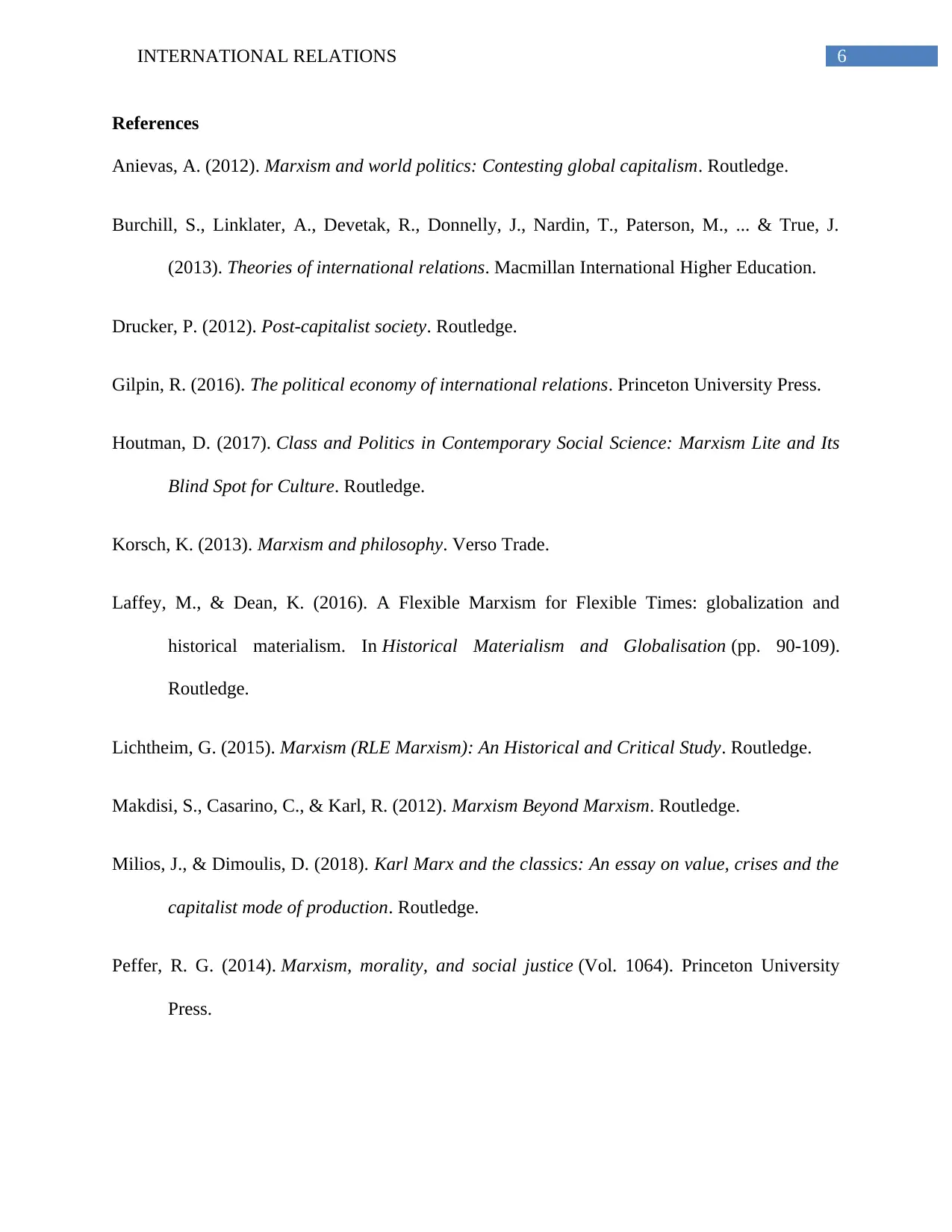
6INTERNATIONAL RELATIONS
References
Anievas, A. (2012). Marxism and world politics: Contesting global capitalism. Routledge.
Burchill, S., Linklater, A., Devetak, R., Donnelly, J., Nardin, T., Paterson, M., ... & True, J.
(2013). Theories of international relations. Macmillan International Higher Education.
Drucker, P. (2012). Post-capitalist society. Routledge.
Gilpin, R. (2016). The political economy of international relations. Princeton University Press.
Houtman, D. (2017). Class and Politics in Contemporary Social Science: Marxism Lite and Its
Blind Spot for Culture. Routledge.
Korsch, K. (2013). Marxism and philosophy. Verso Trade.
Laffey, M., & Dean, K. (2016). A Flexible Marxism for Flexible Times: globalization and
historical materialism. In Historical Materialism and Globalisation (pp. 90-109).
Routledge.
Lichtheim, G. (2015). Marxism (RLE Marxism): An Historical and Critical Study. Routledge.
Makdisi, S., Casarino, C., & Karl, R. (2012). Marxism Beyond Marxism. Routledge.
Milios, J., & Dimoulis, D. (2018). Karl Marx and the classics: An essay on value, crises and the
capitalist mode of production. Routledge.
Peffer, R. G. (2014). Marxism, morality, and social justice (Vol. 1064). Princeton University
Press.
References
Anievas, A. (2012). Marxism and world politics: Contesting global capitalism. Routledge.
Burchill, S., Linklater, A., Devetak, R., Donnelly, J., Nardin, T., Paterson, M., ... & True, J.
(2013). Theories of international relations. Macmillan International Higher Education.
Drucker, P. (2012). Post-capitalist society. Routledge.
Gilpin, R. (2016). The political economy of international relations. Princeton University Press.
Houtman, D. (2017). Class and Politics in Contemporary Social Science: Marxism Lite and Its
Blind Spot for Culture. Routledge.
Korsch, K. (2013). Marxism and philosophy. Verso Trade.
Laffey, M., & Dean, K. (2016). A Flexible Marxism for Flexible Times: globalization and
historical materialism. In Historical Materialism and Globalisation (pp. 90-109).
Routledge.
Lichtheim, G. (2015). Marxism (RLE Marxism): An Historical and Critical Study. Routledge.
Makdisi, S., Casarino, C., & Karl, R. (2012). Marxism Beyond Marxism. Routledge.
Milios, J., & Dimoulis, D. (2018). Karl Marx and the classics: An essay on value, crises and the
capitalist mode of production. Routledge.
Peffer, R. G. (2014). Marxism, morality, and social justice (Vol. 1064). Princeton University
Press.
Paraphrase This Document
Need a fresh take? Get an instant paraphrase of this document with our AI Paraphraser

7INTERNATIONAL RELATIONS
Schwarzmantel, J. (2012). Rethinking Marxism and nationalism in an age of
globalization. Rethinking Marxism, 24(1), 144-161.
Schwarzmantel, J. (2012). Rethinking Marxism and nationalism in an age of
globalization. Rethinking Marxism, 24(1), 144-161.
1 out of 8
Related Documents
Your All-in-One AI-Powered Toolkit for Academic Success.
+13062052269
info@desklib.com
Available 24*7 on WhatsApp / Email
![[object Object]](/_next/static/media/star-bottom.7253800d.svg)
Unlock your academic potential
Copyright © 2020–2025 A2Z Services. All Rights Reserved. Developed and managed by ZUCOL.





